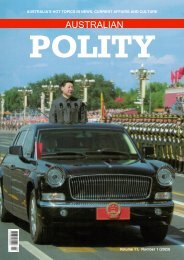Australian Polity, Volume 10 Number 1 & 2
March 2022 issue of Australian Polity
March 2022 issue of Australian Polity
- No tags were found...
Create successful ePaper yourself
Turn your PDF publications into a flip-book with our unique Google optimized e-Paper software.
The Australian media has been awash with reports
of the significant victory by Republican Glenn
Youngkin over incumbent Democrat Terry
McAuliffe in the poll for the governorship of the American
state of Virginia on November 2. Much has been written
and reported about the result, especially for the prospects
of the Democratic Party at the mid-term elections in
2022. But election results closer to Australia may be of
greater significance for us.
Three days before the Virginia poll, the Japanese voted in
national elections following the resignation of Yoshihide
Suga who had been in office for about a year. Suga, a
replacement for Shinzo Abe - who had served as Prime
Minister for the previous eight years - was suffering
declining popularity linked to Covid and the Olympic
Games. It was expected that the opposition would
perform well, especially after four non-government parties
promoted a common policy platform. The expectation was
that a significant swing against the conservative Liberal
Democratic Party would result in its reliance on pacifist
parties in the Parliament to govern, and a weakening of
Japanese defiance of China and support for Taiwan. But
the swing against the government was limited, with the
LDP winning 261 of the 465 seats, a reduction of just
23. Consequently, Fumio Kishida was confirmed as the
100th Prime Minister of Japan.
The attitude of the Japanese leadership about China and
Taiwan has strengthened this year. In July, the nation’s
longest serving Deputy Prime Minister, Taro Aso, said
that an attack on Taiwan would be an ‘existential threat’
to Japan’s security. ‘If a major incident happened, it’s
safe to say it would be related to a situation threatening
the survival of Japan. If that is the case, Japan and the
US must defend Taiwan together.’
A few weeks earlier, the Deputy Defence Minister, Yasuhide
Nakayama, told a US thinktank that ‘we are not friends of
Taiwan, we are brothers’, adding it was time to ‘protect
Taiwan a democratic country.’ In July, the defence minister,
Kishi Nobuo noted that the deployment of missiles to
Ishigaki, an island closer to Taiwan, could provide a
defence umbrella should China attack.
These statements were followed by the first ever security
dialogue between the LDP and Taiwan’s ruling Democratic
Progressive Party in August at which both parties shared
concerns about China’s aggression and committed to
strengthened cooperation.
Although the new Japanese Prime Minister had been
considered more dovish on foreign policy in the past,
his statements both during the election campaign and
since have revealed a tougher approach to the Chinese
regime. He observed in September that Taiwan was on
the ‘front line’ in the clash between authoritarianism and
democracy. Speaking since his election, Kishida described
Taiwan as ‘a critical partner and important friend’ saying
that ‘we hope to further strengthen co-operation and
exchanges between Japan and Taiwan.’ Significantly, he
has retained Defence Minister Nobuo Kishi, a pro-Taiwan
advocate, and Foreign Minister Motegi Toshimitsu, who
has been working closely with his Taiwanese counterparts
in response to Covid.
Japan, the current chair of the Comprehensive and
Progressive Agreement for the Trans-Pacific Partnership,
has signalled support for Taiwan’s bid to enter the
arrangement. Taiwan’s ban on Japanese food imports
from the Fukushima region has been a sticking point in
deepening trading relations between the two states,
but the Republic of China Government has considered
lifting the ban which other countries, such as Australia,
do not impose.
Japan has announced that it will authorise a new
National Security Strategy by the end of 2022. Kishida’s
Government is likely also to sign a coast guard cooperation
agreement with Taiwan, as it did with the
US. The Japanese ambassador to Australia, Shingo
Yamagami, has offered his nation’s cooperation with
AUKUS. Similarly, as Foreign Minister, Kishida reached
out to India in 2015 to agree on an Indo-Pacific Vision
2025 which has strengthened relations between the two
nations threatened by China.
Another, little known factor in Fumio Kishida’s openness
to Taiwan is personal. Following the Qing dynasty’s
agreement to cede Formosa to Japan at the conclusion
of the first Sino-Japanese war in 1895, Kishida’s greatgrandfather
moved to the island where he conducted a
business in the coastal city of Keelung, 25 kilometres
north-east of Taipei. The family eventually returned to
10 Australian Polity





